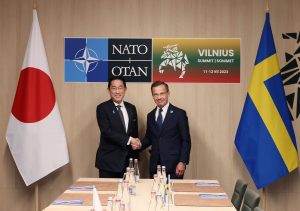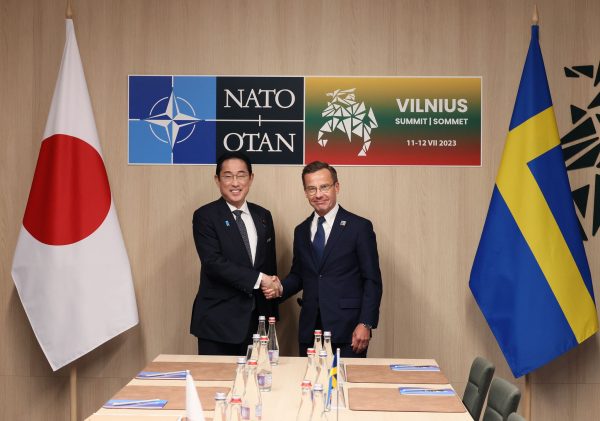
Japanese Prime Minister Kishida Fumio meets with Swedish Prime Minister Ulf Kristersson on the sidelines of the NATO summit in Vilnius, Lithuania, July 12, 2023. Sweden is poised to join NATO as the newest member.
Credit: Prime Minister’s Office of Japan
Japan and the North Atlantic Treaty Organization (NATO) have laid out fresh plans to expand defense and security cooperation in a new era of increased NATO interest in the Indo-Pacific region. Japanese Prime Minister Kishida Fumio attended the NATO summit in Lithuania on July 11-12, with an eye on contributing long term support to Ukraine in the face of Russian aggression.
But Kishida’s visit was more than just about Ukraine. He is seeking to expand Japan’s partnership with NATO and direct NATO attention toward China’s military build up in the Indo-Pacific.
This was the second time Kishida attended a NATO summit as a non-member. Kishida, as well as leaders from South Korea, Australia and New Zealand, attended the Madrid summit in 2022 as well.
From Lithuania, Kishida appealed to international leaders, repeating his warning that “[t]oday’s Ukraine may be tomorrow’s East Asia.” He also stressed the need for solidarity among European allies against China’s “unilateral attempts to change the status quo by force or coercion.”
Diplomat Brief
Weekly Newsletter
N
Get briefed on the story of the week, and developing stories to watch across the Asia-Pacific.
Get the Newsletter
Japan and NATO unveiled a Individually Tailored Partnership Program (ITPP) highlighting areas for cooperation and priority issues such as cyber defense, strategic communication, “disruptive technologies,” space security, and climate change security. Japan’s Self Defense Forces (SDF) will also participate in NATO troop exercises.
China slammed the ITPP framework as “full of cold war era thinking and ideological prejudice.” It also blamed NATO for causing chaos in the Asia-Pacific. China maintains a friendly relationship with Russia and has failed to denounce the invasion of Ukraine. The European Union and United States have warned China against providing support to Russia’s war efforts.
NATO was originally formed in 1949 as a deterrent to the threat of Soviet expansion. But its position toward China has hardened since Russia invaded Ukraine. At the Vilnius summit, NATO leaders adopted a joint statement saying that China’s “ stated ambitions and coercive policies challenge our interests, security and values.”
Earlier this year NATO Secretary-General Jens Stoltenberg criticized China for spreading false information about NATO and the war in Ukraine. He also explained how decades ago “China was not on NATO’s agenda” but now the “security of Europe, the Atlantic and the Indo-Pacific is closely connected.”
Advertisement
Similarly, last May U.S. Ambassador to Japan Rahm Emanuel praised Kishida and U.S. President Joe Biden for bringing “what used to be a transatlantic alliance and an Indo-Pacific framework into a single strategic sphere.”
During the latest summit, U.S. Ambassador to NATO Julianne Smith stated that NATO had evolved from a Western security organization to an alliance that deals with global issues. She welcomed Japan’s participation as “extremely symbolic” and “an important show of unity for Ukraine.”
But France, on the other hand, is cautious of Japan’s involvement with NATO. French President Emmanuel Macron said he is reluctant to get involved with growing conflict in the Asia-Pacific. He rejected plans for creating a liaison NATO office in Tokyo, following China’s fierce opposition to the idea. At the G-7 Hiroshima Summit in May, Macron said China should not be provoked and argued for changing the tone of the G-7 joint statement.
But Stoltenberg says a future Tokyo outpost is still in the cards. The office is symbolic of NATO’s growing involvement in the Indo-Pacific and it is also a way to deter China, which is deepening its ties with Russia. Japan has territorial disputes with both Beijing and Moscow.
Japan and NATO have enjoyed formal ties for 30 years, but Russia and China are pushing the Japan-NATO relationship closer together. At the end of the summit Stoltenberg referred to Japan as NATO’s closest partner country. The revised ITPP is a critical moment for Japan as it looks for a fresh opportunity to involve Western countries in Japan’s effort to strengthen its free and open Indo-Pacific regional security strategy against China.
